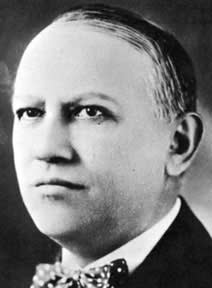Carl Laemmle
- This article is about Carl Laemmle, the founder of Universal Pictures. See also Carl Laemmle Jr. for an article about his son.
Carl Laemmle | |
|---|---|
 | |
| Years active | 1909 - 1936 |
| Children | Carl Laemmle, Jr. (1908-1979) |

Carl Laemmle Sr. (17 January 1867 – 24 September 1939), born in Laupheim, Württemberg, Germany, was a pioneer in American film making and a founder of one of the original major Hollywood movie studios - Universal. Laemmle produced or was otherwise involved in over four hundred films.
Regarded as one of the most important of the early film pioneers, Laemmle was born on the Radstrasse just outside the former Jewish quarter of Laupheim, Germany. He emigrated to the United States in 1884, working in Chicago as a bookkeeper or office manager for 20 years. He began buying nickelodeons, eventually expanding into a film distribution service, the Laemmle Film Service.
On 8 June 1912, in New York, Carl Laemmle of the Independent Motion Picture Company, Pat Powers of Powers Picture Company, Mark Dintenfass of Champion Films, and Bill Swanson of American Éclair, all signed a contract to merge their studios. The four formed a famous name in Hollywood production history, the Universal Motion Picture Manufacturing Company. They formed it in 1914 with the purchase of 235 acres (0.95 km2) of land in the San Fernando Valley.
In the early and mid-1930s Laemmle's son, Carl Laemmle Jr., produced a series of expensive and commercially unsuccessful films for the studio, although there were occasional successes such as the 1932 Back Street, the 1936 Show Boat, and Universal's famous collection of 1930's horror classics. Carl and Carl Jr. were forced out of the company in 1936.
Laemmle remained connected to his home town of Laupheim throughout his life, by financial support and also by sponsoring hundreds of Jews from Laupheim and Württemberg to emigrate from Nazi Germany to the U.S. (which meant paying both emigration and immigration fees), thus saving them from the Holocaust. In order to ensure and facilitate their immigration Laemmle contacted American authorities, members of the House of Representatives and the Secretary of State, Cordell Hull. He also intervened in the fate of the refugees on board the SS St. Louis who were ultimately sent back from Havana to Europe in 1939.[1]
Following his death from cardiovascular disease on 24 September 1939, in Beverly Hills, California, at the age of 72, Laemmle was entombed in the Chapel Mausoleum at Home of Peace Cemetery.
Asked how to pronounce his name, he told The Literary Digest “The name means little lamb, and is pronounced as if it were spelled ‘lem-lee’.” (Charles Earle Funk, What's the Name, Please?, Funk & Wagnalls, 1936.)
The poet Ogden Nash observed the following about Laemmle's habit of giving his son and nephews the top executive positions in his studios:
"Uncle Carl Laemmle
Has a very large faemmle."[2]
The main character in the 1949 novel The Dream Merchants by Harold Robbins, a former Universal Studios employee, is based upon Carl Laemmle.
His niece, Rebekah Isabelle Laemmle, known professionally as Carla Laemmle appeared in several films until her withdrawal from filming at the end of the 1930s.
Laemmle was used as a character in The Adventures of Young Indiana Jones.
References
- ^ "Jüdische Zeitung". Retrieved 2007-12-11.
- ^ "Carl Laemmle und Universal Pictures". Retrieved 2007-12-11.
